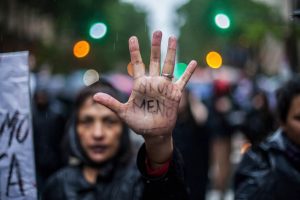(THIS ARTICLE IS MACHINE TRANSLATED by Google from Norwegian)
In the essay collection The Force of Nonviolence writes the American philosopher, gender scientist and literary theorist Judith Butler on the relationship between physical and mental nonviolence, systemic racism as well as other structural forms of discrimination. But how does systemic discrimination relate to non-violence?
Butler's academic language and analysis of the theories Michel Foucault, Frantz Fanon, Walter Benjamin and other philosophers at times make it hard to keep up, but the message still shines through: The philosophical, ethical and political approach to nonviolence is based on the fact that some people in society are systematically defined as more "grievable" (worthy of mourning) than others. .
Such a message means that some people are defined as more worthy than others, that their deaths mean more than the loss of people belonging to vulnerable groups: refugees, women, transgender people and so on, who are systematically defined as "ungrievable" (not worthy of mourning ).
Aggressive and sustainable
In contrast to how theories of physical and mental nonviolence are often associated with passivity and harmony, Butler redefines the theory of nonviolence into an aggressive and sustainable resistance movement to combat social inequalities in society. She writes that racism, xenophobia, homophobia and misogyny make some lives more worthy of grief than others, and uses the Black Lives Matter movement, the refugee crisis and violence against Latin American women and trans women as a theoretical framework.
Racism, xenophobia, homophobia and misogyny make some human lives more
worthy of grieving over others.
As an example of Butler's claim of worthy and unworthy lives, recently the tragic demise of basketball legend Kobe Bryant and his daughter more headlines in the media than, for example, the deaths of children in Yemen, who are dying in the thousands at this moment.
This year's award of the Grammy Prize opened with a tribute to Kobe Bryant, and several of the performers paid tribute to him throughout the broadcast. Essential questions that popped into my head after seeing this were: What about the kids in the Middle East, people who die on the run, in war – and not least, black people who are being treated unfairly in the justice system or killed on the open street? Why doesn't a whole world mourn them?

How can people who did not know Bryant and his daughter personally grieve for their death, but not for all the other deaths that occur every second? The answer to these questions lies in the unfair social structure on which society is built.
Butler writes: “Violence legitimizes the social structure, and the social structure exceeds every act that is repeatedly manifested and reproduced. This is a loss of human life that should never have taken place, which should never happen again: Ni una menos. ”1
Structural violence
Butler believes that the legal structure of society permits murder, a "license to kill". Legal or structural violence occurs every single day around the world through the impunity practiced by the judges, the legal killers.
According to Butler, violence occurs through both legal refusal and wrongful recognition of violence: "No notification means no crime, no punishment and no damages." Structural violence exists not only through impunity, but also in the binding nature of the law: "If we do not follow the law, the law will seize us."
The philosophical, ethical and political approach to nonviolence is based on the fact that some people in society are systematically defined as more "grievable" (worthy of grief)
above) than others.
If we remove the social differences in society and rather create an equal world in which all human lives are worth much, nonviolence can be practiced. But to get there, we must understand how each individual life is related to the lives of others, and that we depend on each other: "I" exists only through a "you".
Butler argues that both "I" and "you" need a sustainable world to survive, and that together we can achieve this first by recognizing our global non-violence obligations to each other. Human ties can be strengthened through solidarity – which already disputes the necessity of violence. Nonviolence can only be achieved through equality and equality.
But can humans not take into account their own ego and greed and start thinking sustainably, both for each other and for the planet? The climate crisis we have set ourselves in is a clear example of this being merely wishful thinking.
- Not one less (Not one woman less) is an Argentinian feminist movement that fights against gender-based violence.






